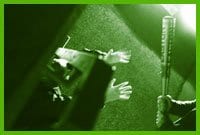Is gaybashing still a favoured pastime among insecure straight men or is it a hobby in decline?
It depends whether you think having “die faggot” yelled at you in the street is different from hearing shouts of “fucking faggot.”
In 2002, Toronto police received 11 reports of gay bashing, down from 24 reports in 2001.
“It was as high as 44 in 1999 and down to 11 in 2002, so something good is happening,” says Det James Hogan of the Toronto Police Service’s Hate Crimes Unit.
But while Toronto police say hate crimes against gay men and lesbians are becoming less frequent, anti-violence workers say gaybashing is on the rise. It’s a disparity that has Howard Shulman, program coordinator of the 519 Community Centre anti-violence program, concerned.
“There was an increase in the number of reports of bashing that were reported to our program in 2002 over 2001,” says Shulman. The total number of bashing incidents reported to the program in 2002 was 65.
“The police have a different definition of what a hate crime is than we do. So for instance we will report instances of verbal harassment, whereas the police wouldn’t usually consider that a hate crime.”
According to police, uttering “die faggot,” is a hate crime because it contains a death threat. The death threat plus the slur makes this a prosecutable hate crime.
But the similar phrase “fucking faggot” contains no direct threat, and is therefore not considered a hate crime by police.
(Note that these are offences against an individual; hateful speech against homosexuals as a group is not covered under law because sexual orientation is not included in the definition of hate propaganda crimes.)
“We understand that that’s very upsetting and hateful but it’s not a crime,” says Hogan.
Shulman says the police need to broaden their hate crime definitions to include more subtle verbal threats, graffiti and lesser forms of physical harassment.
Police admit that their definitions are limited, but it’s just one of several factors that prevents them from convicting gaybashers.
“A lot of the crimes that we report aren’t physical assaults, they are hate mails, graffiti on buildings, a rock through a window in the middle of the night. They are very cowardly things,” says Hogan. “They are not the kind of crime that people are very keen to stand up to and take ownership of, so it’s hard to identify people to begin with.”
When police do find a basher, in order to get a hate crime conviction they have to prove that hate or bias was the motivation. Unless the basher has a history of similar offences or admits to acting out of hate, proving that motivation to a judge can be difficult.
A recent study from Northeastern University lends weight to the unsurprising theory that gay bashers are fuelled by their own insecurities.
“Given that heterosexual males appear to express anti-pathy toward gay men as a way to express their masculinity, similar identity concerns could lead to more malevolent attempts to distance themselves from any suspicion of homosexuality,” and this could lead to gaybashing, wrote researcher Richard Gramzow.
Also contributing to the police’s low gaybashing numbers is the fact that victims often avoid going to the police out of fear they won’t be taken seriously. The police admit their relationship with gay and lesbian people has historically been less than friendly.
“I understand that some people feel that they would get second class service from the police,” says Const Doug Ord of the Toronto police community relations office. “But I don’t believe that it’s true.
“You can’t say, ‘Well I’ve been assaulted but I don’t feel like going to the police because I think I will be victimized,'” says Ord. “If you overcome that and go to the station and report it, you may find that lo and behold it works out okay.”
Clearly, gay men and lesbians are still vulnerable to bashing. So how do we protect ourselves?
“Don’t be brave,” advises the University Of Toronto website, “Run if you feel threatened” and “Don’t respond to verbal taunts from anyone.”
But is this common sense or victim mentality?
“I think what we’re trying to suggest is for people to assess their safety,” says Jude Tate, coordinator of Lesbian Gay Bisexual Transgendered Queer Resources And Programs at U of T. “Sometimes it’s wiser to not respond, particularly if you are in an isolated situation.”
Tate advocates a broadening of the definition in order to include gay on gay violence and domestic abuse within the community.

 Why you can trust Xtra
Why you can trust Xtra


